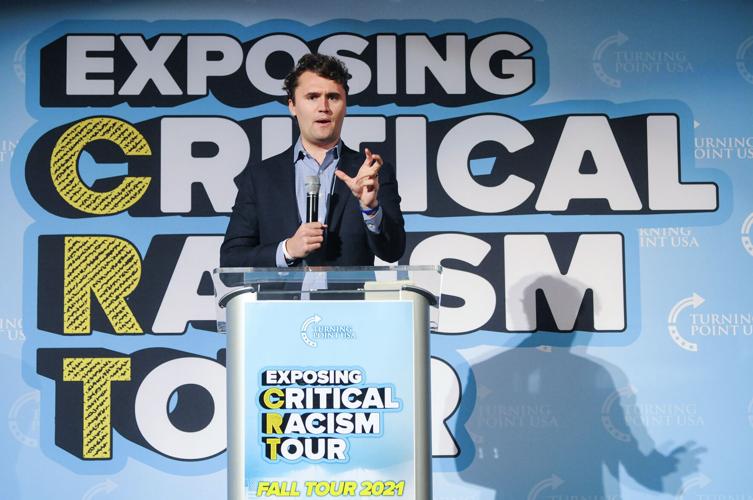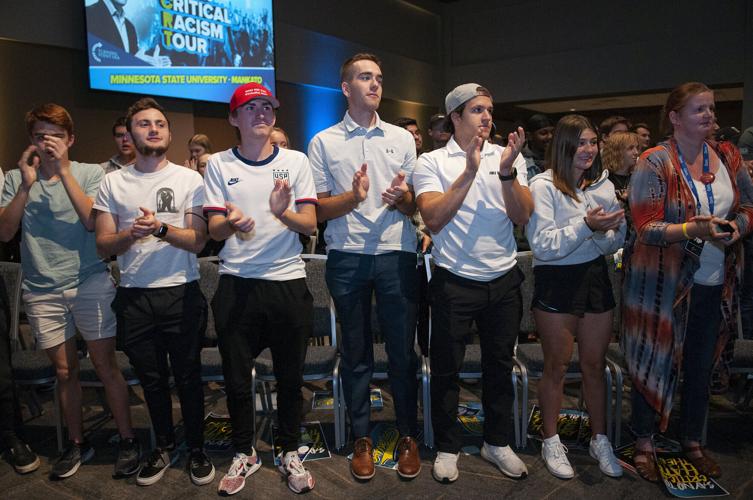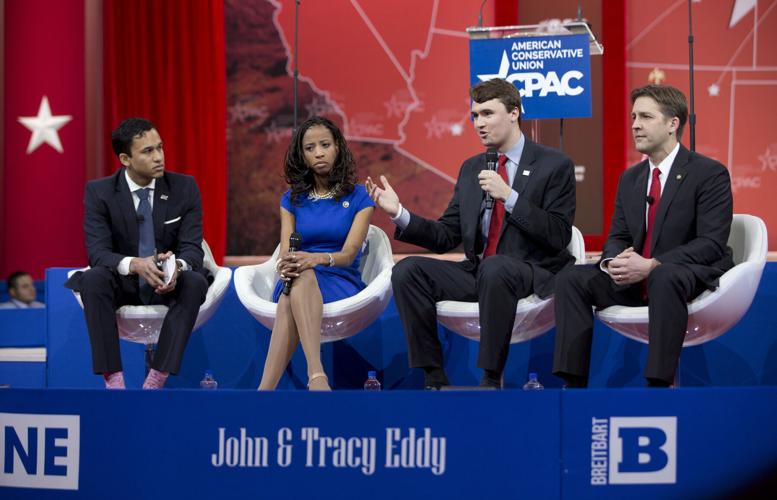After a rejection from West Point, Charlie Kirk was 18 when he launched a grassroots organization from an Illinois garage that would grow alongside the rise of President Donald Trump and fuel the "Make America Great Again" movement.
Kirk said he had "no money, no connections and no idea what I was doing" when he started Turning Point USA in 2012. Yet, his rhetorical gifts for countering progressive ideas, inflaming cultural tensions and making provocative declarations instantly resonated with college audiences.
Clips of his early campus appearances spread online, helping him secure a steady stream of donations that transformed Turning Point into one of the country's largest political organizations, attracting young people to star-studded gatherings and making it a presence at high schools and colleges around the country.
"No one understood or had the heart of the youth in the United States of America better than Charlie," Trump said Wednesday after Kirk was assassinated while speaking at a college in Utah.
People are also reading…

Charlie Kirk, center, conservative activist and founder of Turning Point USA, speaks to supporters of President Donald Trump at a Nov. 6, 2020, rally in Phoenix.
Early on, Kirk described his group as a student organization that advocated for free markets and limited government. He needled peers who bashed capitalism and backed presidential candidate and democratic socialist Bernie Sanders yet "shamelessly enjoy the fruits of the free market," like Starbucks, Amazon and Netflix.
Over time, Turning Point held mass rallies that drew tens of thousands of young voters each year to hear top conservative leaders speaking on glitzy stages with massive screens, pyrotechnics and lighting shows befitting a stadium concert.
Alongside Turning Point's growth, Kirk's fame skyrocketed, and he leveraged his nonprofit, celebrity status and a successful podcast into considerable personal wealth.
It is not immediately clear who will lead Turning Point after Kirk's death.
"You don't replace a Charlie Kirk," Trump told reporters Thursday. "He was unique."

Turning Point USA founder Charlie Kirk speaks to an audience Oct. 5, 2021, in Mankato, Minn., on his "Exposing Critical Racism Theory" tour.
Turning Point spreads conservative ideas across college campuses
In his college stops, Kirk would often sit beneath a tent — as he was when he was shot — often behind his "Prove Me Wrong" table.
He mainly drew young conservatives who said they often felt unwelcome or out of place at school. He had hundreds of Turning Point employees and volunteers there to recruit students into becoming GOP voters and activists themselves.
The real draw, however, was Kirk arguing with students. He seemed to relish jeers of less friendly audiences.
Kirk frequently repeated Trump's false claims and espoused culturally conservative views, advocating for gun rights, condemning abortion, holding up women as wives and mothers — and men as heads of households. He mastered the art of the "what about?" retort, turning questions back on progressives and liberals who challenged him.
Kirk was sometimes kept away from schools. In 2018, Turning Point said a Chicago university denied requests for him to speak on their campus citing safety concerns, and a Florida high school would not allow him to speak to students two months after a teenager with an assault rifle killed 17 people there.

Minnesota State University Mankato students applaud Charlie Kirk as he finished his speech Oct. 5, 2021, at an event in Mankato, Minn.
Kirk helped mobilize youth for Trump
In 2024, Kirk used his speech at the Republican National Convention in Milwaukee to praise Trump as an economic master and argue that Gen Z voters could not afford another Democratic administration.
Speaking directly to his generation, the multimillionaire influencer said, "You don't have to stay poor. You don't have to accept being worse off than your parents. You don't have to support leaders who lied to you and took advantage of you for your vote."
According to AP VoteCast, a survey of the 2024 electorate, 47% of voters aged 18-29 opted for Trump, while 51% went for former Vice President Kamala Harris, the Democratic presidential nominee. That was a much narrower gap than in 2020, when Joe Biden outpaced Trump 61% to 36%.
"I want to express my tremendous gratitude to Charlie Kirk. He's really an amazing guy. Amazing guy. And his whole staff for their relentless efforts to achieve this very historic victory," Trump said at a Turning Point gathering in Arizona last December.
Vice President JD Vance said Kirk's influence continued past the inauguration. "So much of the success we've had in this administration traces directly to Charlie's ability to organize and convene," Vance said on social media late Wednesday. "He didn't just help us win in 2024, he helped us staff the entire government."

From left, Republican National Committee deputy press secretary Raffi Williams, Rep. Mia Love, R-Utah; Turning Point USA CEO Charlie Kirk and Sen. Ben Sasse, R-Neb., participate in a panel discussion Feb. 26, 2015, in National Harbor, Md.
Young conservatives call him mentor and inspiration
Several young politicians and figures credit Kirk with inspiring or boosting their public careers.
White House press secretary Karoline Leavitt said he was one of the first "to believe in me." When she ran for Congress from New Hampshire in 2022, Kirk endorsed her in the Republican primary. She lost the general election.
Kirk "believed in the potential and promise of young people," she said. "He inspired millions of them to get involved in politics and fight for our nation's conservative values."
Vance said Kirk first reached out through a private message on Twitter after a Fox News appearance in 2017 when he was an author and not a politician. They became friends, and Kirk was one of the first people Vance called when he thought of running for the U.S. Senate in early 2021. Kirk introduced him to people who eventually ran his campaign — and to Donald Trump Jr.
"Don took a call from me because Charlie asked him too," Vance posted on social media.
Anna Paulina Luna, a Florida Republican congresswoman, said Kirk recruited her as national Hispanic outreach director when she was planning to attend medical school.
"He's part of the reason I'm in office right now," Luna said of Kirk from outside the Capitol Wednesday.
Kennedy Peterson, 20, was among the young people who came to Turning Point headquarters after Kirk's death was announced Wednesday.
"From the day that he started with the Campus Victory Project, I think that his intentions were to create a world that he thought was better than what we have now," Peterson said.
Read more:
Photos: Notable deaths in 2025
Kitty Dukakis

Kitty Dukakis, the wife of former Massachusetts governor and Democratic presidential candidate Michael Dukakis, who spoke openly about her struggles with depression and addiction, died Friday, March 21. She was 88.
Mia Love

Former U.S. Rep. Mia Love of Utah, a daughter of Haitian immigrants who became the first Black Republican woman elected to Congress, died Sunday, March 23. She was 49.
Denis Arndt

Denis Arndt, a character actor and favorite of TV writer and producer David E. Kelley, getting cast in “L.A. Law,” “Picket Fences” and “Chicago Hope,” and later earning a Tony nomination for his Broadway debut at age 77 in a play about mismatched lovers, died March 25. He was 86.
Richard Chamberlain

Richard Chamberlain, the handsome hero of the 1960s television series "Dr. Kildare" who found a second career as an award-winning "king of the miniseries," died Saturday, March 29. He was 90.
Val Kilmer

Val Kilmer, the brooding, versatile actor who played fan favorite Iceman in “Top Gun,” donned a voluminous cape as Batman in “Batman Forever” and portrayed Jim Morrison in “The Doors,” died April 1. He was 65.
Wink Martindale

Wink Martindale, the genial host of such hit game shows as “Gambit” and “Tic-Tac-Dough” who also did one of the first recorded television interviews with a young Elvis Presley, died April 15. He was 91.
Pope Francis

Pope Francis, history’s first Latin American pontiff who charmed the world with his humility and concern for the poor but alienated conservatives over climate change and critiques of capitalism, died April 21. He was 88.
Steve McMichael

Steve McMichael, a star defensive tackle on the Chicago Bears’ famed 1985 Super Bowl championship team, died April 23 following a battle with ALS. He was 67.
Ruth Buzzi

Ruth Buzzi, who rose to fame as the frumpy and bitter Gladys Ormphby on the groundbreaking sketch comedy series “Rowan & Martin’s Laugh-In” and made over 200 television appearances during a 45-year career, died May 1. She was 88.
Jim Dent

Jim Dent, who grew up in the caddie yards of Augusta, Georgia, and went on to become one of the PGA Tour's longest hitters and one of the top Black golfers of his generation, died May 2. He was 85.
James Foley

James Foley, a journeyman director best known for “Glengarry Glen Ross,” died May 6. He was 71.Â
David H. Souter

Retired Supreme Court Justice David H. Souter, the ascetic bachelor and New Hampshire Republican who became a favorite of liberals during his nearly 20 years on the bench, died May 8. He was 85.
Johnny Rodriguez

Country music star Johnny Rodriguez, a popular Mexican American singer best known for chart-topping hits in the 1970s such as “I Just Can’t Get Her Out of My Mind,” “Ridin’ My Thumb to Mexico” and “That’s the Way Love Goes,” died May 9. He was 73.
Robert Benton

Robert Benton, the Oscar-winning filmmaker who helped reset the rules in Hollywood as the co-creator of "Bonnie and Clyde," and later received mainstream validation as the writer-director of "Kramer vs. Kramer" and "Places in the Heart," died May 11. He was 92.
Charles Strouse

Three-time Tony Award-winner Charles Strouse, Broadway's industrious, master melody-maker who composed the music for such classic musical theater hits as "Annie," "Bye Bye Birdie" and "Applause," died May 14. He was 96.
George Wendt

George Wendt, an actor with an Everyman charm who played the affable, beer-loving barfly Norm on the hit 1980s TV comedy “Cheers” and later crafted a stage career that took him to Broadway in “Art,” “Hairspray” and “Elf,” died May 20. He was 76.
Jim Irsay

Jim Irsay, the Indianapolis Colts’ owner who leveraged the popularity of Peyton Manning into a new stadium and a Super Bowl title, died May 21 at age 65.Â
Dave Shapiro

Dave Shapiro, a groundbreaking music executive in the heavy metal and hard rock scene, died May 22 in a San Diego plane crash. He was 42.
Marcel Ophuls

Marcel Ophuls, the Academy Award-winning filmmaker whose landmark 1969 documentary “The Sorrow and the Pity” shattered the comforting myth that most of France had resisted the Nazis during World War II, died May 24. He was 97.
Phil Robertson

Phil Robertson, who turned his small duck calling interest in the sportsman's paradise of northern Louisiana into a big business and conservative cultural phenomenon, died May 25, according to his family. He was 79.
Rick Derringer

Guitarist and singer Rick Derringer, who shot to fame at 17 when his band The McCoys recorded “Hang On Sloopy,” had a hit with “Rock and Roll, Hoochie Koo” and earned a Grammy Award for producing “Weird Al ” Yankovic's debut album, died May 26. He was 77.
Loretta Swit

Loretta Swit, who won two Emmy Awards playing Maj. Margaret Houlihan, the demanding head nurse of a behind-the-lines surgical unit during the Korean War on the pioneering hit TV series “M.A.S.H.,” died May 30 at her New York City home, likely from natural causes, publicist Harlan Boll said. She was 87.
Jonathan Joss

Jonathan Joss, a voice actor best known for his work on the animated television series "King of the Hill," was fatally shot near his Texas home June 2. He was 59.
Sly Stone

Sly Stone, the revolutionary musician and dynamic showman whose Sly and the Family Stone transformed popular music in the 1960s and ’70s and beyond with such hits as “Everyday People,” “Stand!” and “Family Affair,” died June 9. He was 82
Brian Wilson

Brian Wilson, the Beach Boys’ visionary and fragile leader who helped compose and arrange “Good Vibrations,” “California Girls” and dozens of other summertime anthems and became one of the world’s most influential and admired musicians, died June 11. He was 82.
Anne Burrell

TV chef Anne Burrell, who coached culinary fumblers through hundreds of episodes of “Worst Cooks in America,” died June 17 at her New York home. She was 55.
Jimmy Swaggart

Televangelist Jimmy Swaggart, who became a household name amassing an enormous following and multimillion-dollar ministry only to be undone by his penchant for prostitutes, died July 1. He was 90.
Michael Madsen

Michael Madsen, the actor best known for his coolly menacing, steely-eyed, often sadistic characters in the films of Quentin Tarantino including “Reservoir Dogs” and “Kill Bill: Vol. 2,” died July 3. He was 67.
Malcolm-Jamal Warner

Malcolm-Jamal Warner, who as teenage son Theo Huxtable on “The Cosby Show” was central to a cultural phenomenon that helped define the 1980s, died July 20 in an accidental drowning in Costa Rica. He was 54.
Ozzy Osbourne

Ozzy Osbourne, the gloomy, demon-invoking lead singer of the pioneering band Black Sabbath who became the throaty, growling voice — and drug-and-alcohol ravaged id — of heavy metal, died July 22, just weeks after his farewell show. He was 76.
Chuck Mangione

Two-time Grammy Award-winning musician Chuck Mangione, who achieved international success in 1977 with his jazz-flavored single “Feels So Good” and later became a voice actor on the animated TV comedy “King of the Hill,” died July 22. He was 84.
Hulk Hogan

Hulk Hogan, the mustachioed, headscarf-wearing, bicep-busting icon of professional wrestling who turned the sport into a massive business and stretched his influence into TV, pop culture and conservative politics during a long and scandal-plagued second act, died July 24 in Florida. He was 71.
Tom Lehrer

Tom Lehrer, a song satirist who gained a popular following in the 1950s and ’60s lampooning marriage, politics, racism and the Cold War, and then largely abandoned his music career to return to teaching math at Harvard and other universities, died July 26. He was 97.
Ryne Sandberg

Ryne Sandberg, a Hall of Fame second baseman who became one of baseball’s best all-around players while starring for the Chicago Cubs, died July 28. He was 65.
Jeannie Seely

Jeannie Seely, the soulful country music singer behind such standards like “Don’t Touch Me,” died Aug. 1. She was 85.
Terence Stamp

Terence Stamp, the British actor who often played the role of a complex villain, including that of General Zod in the early Superman films, died Aug. 17. He was 87.
Jerry Adler

Jerry Adler, who spent decades behind the scenes of storied Broadway productions before pivoting to acting in his 60s with roles on “The Sopranos” and “The Good Wife,” died Aug. 23. He was 96.
Davey Johnson

Davey Johnson, an All-Star second baseman who won the World Series twice with the Baltimore Orioles as a player and managed the New York Mets to the title in 1986, died Sept. 5. He was 82.
Rick Davies

Rick Davies, the co-founder, singer and songwriter of British band Supertramp, died Sept. 6 after a long battle with cancer, the band said. He was 81.
Charlie Kirk

Turning Point USA co-founder Charlie Kirk speaks Sept. 4, 2024, at a Turning Point event in Mesa, Ariz. The conservative activist died at the age of 31 on Sept. 10, 2025, after he was shot at an event on the Utah Valley University campus in Orem.
Polly Holliday

Polly Holliday, a Tony Award-nominated screen and stage actor who turned the catchphrase “Kiss my grits!” into a national retort as the gum-chewing, beehive-wearing waitress aboard the long-running CBS sitcom “Alice,” died Sept. 10. She was 88.



















